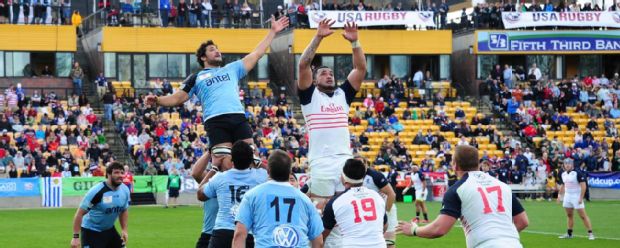|
Americas Rugby Championship
Pan-American tournament gives rugby a welcome new dimension
Huw Richards
December 10, 2015
 © Photo by Scott Cunningham/Getty Images Good on you Argentina. The history of rugby union is largely one of stronger nations neglecting near neighbours - one need think only of Australia and New Zealand's treatment of the Pacific Islands or the complete lack of British and Irish interest in continental rugby. The conspicuous exception to that is of course, France and its husbandry of FIRA. But even here a cynic might object that France's interest in its neighbours from the 1930s was impelled more by exclusion from the Five Nations - and the consequent need to find new opponents - than any more noble, disinterested motive. But Argentina's role in the creation of the new Americas championship, whose schedule for 2016 was announced this week, comes just at the point at which its membership of the elite has been fully confirmed, with the Pumas compelling contribution to this year's World Cup and the impending debut of the Argentine-based Super Rugby franchise. Instead of riding off into the sunset with barely a backward glance at America's other rugby nations, Argentina has chosen to engage ever more completely with the continent. But then it always was a bit of a one-off , the one country wholly exempted from Vernon Pugh's strictures when the Welsh QC was lacerating other leading nations as liars, cheats and hypocrites for their behaviour during the death throes of the amateur ideology. And it has in Agustin Pichot, chairman of Americas Rugby, a figure that other countries can only envy - recent enough a player to have strong connections to those still playing and charisma for the game's followers, while at the same time with the presence of one much older and a coherent, achievable vision for the development of his nation's rugby. It is easier for such people to emerge, and progress rapidly to positions of power, at times of flux such as Argentina's transition to professionalism. Stable, longer-established structures tend to mean longer climbs to power. But, still, Argentina and the American continent as a whole, is lucky to have him. In the context of this new six-nation competition, Argentina is there to be shot at. Its combined all-time record against the other five - Brazil, Canada, Chile, USA and Uruguay - is 104 wins and two defeats, including 90-0 against its fellow South Americans. Only Canada have managed to beat the Pumas. As France did with FIRA, the Pumas' presence gives the tournament a standing and cachet it would otherwise lack. Never mind that, also like the French, the demands of other competitions - either Super Rugby, which starts midway through the Americas championship, or players still employed in Europe - mean that the Pumas are unlikely to field anything like a full-strength team. Theirs will still be the match that players and fans from other countries look for. There is, it must be admitted, a strong risk of predictability. Among the other nations Canada usually beats USA, which nearly always beats Uruguay, which usually beats Chile, which routinely beats Brazil. Any deviation from that pattern - and the best bet may come in week two, when USA hosts Canada - will count as a surprise. Anybody reaching a couple of places up the hierarchy, say Brazil beating Uruguay or Chile upsetting the Americans, will be a real shock.  Argentina fans ahead of the Rugby World Cup bronze medal match with South Africa© GLYN KIRK/AFP/Getty Images But those of course are the patterns laid down in times of intermittent competition. The point about the Americas Cup is that those five matches spread across four weeks are aimed to provide the sort of consistent competition that lesser rugby nations cry out for, and are all too often denied. The appeal of a continental championship is evident, but the sheer distances involved and comparatively small following for rugby in most of the competing nations means it was unlikely to have been launched as a purely commercial proposition. This is where World Rugby comes in, providing the funds which make the event possible, and it looks like an excellent use for its money. Rather less noticed amid the hand-wringing over European failure at the World Cup was that neither of the North American nations had a great time, neither winning a match and Canada making an unwelcome habit of blowing leads. But now is surely a time to invest in US rugby, with serious attempts being made to convert displaced American footballers and a professional league imminent, while the Canadians retain many of the attributes that made them the earliest breakthrough nation of the World Cup era. In South America, Uruguay might be accounted yet another Pool of Death victim, capable of winning in other World Cup groups. Chile has regressed a little from the turn of the century, when it contended for World Cup qualification and threatened to overtake Uruguay, but not so far that those do not remain realistic aspirations. And while Brazil's results suggest an initial role as the tournament punchbag, the investment of energy and resources by Premier Rugby and other bodies should make it competitive before long. So there is something in it for everybody, a welcome new dimension for rugby in the Americas. The proof will come in the quality of the competition, and the extent to which it raises both standards and interest across the continent, but that it is being tried at all should be applauded. © ESPN Sports Media Ltd.
|
Live Sports
Communication error please reload the page.
-
Football
-
Cricket
-
Rugby
-
- Days
- Hrs
- Mins
- Secs
F1 - Abu Dhabi GP
Abu Dhabi Grand Prix December 11-131. Max Verstappen ()
2. Valtteri Bottas (Mercedes)
3. Lewis Hamilton (Mercedes)
4. Alexander Albon ()
5. Lando Norris ()
6. Carlos Sainz Jr ()
-
ESPNOtherLive >>
Golf - Houston Open
Snooker - China Open
Tennis - Miami Open

